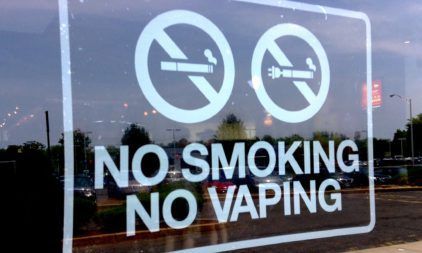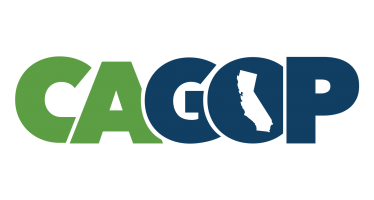San Francisco voters may have chance to overturn vaping ban
 SACRAMENTO – The San Francisco Board of Supervisors voted in June to make the city the first in the country to impose a total sales ban on flavored tobacco products, as similar ordinances spread across the Bay Area. It’s also the first city that will face a well-funded referendum to overturn the law, which is scheduled to go into effect April 2018.
SACRAMENTO – The San Francisco Board of Supervisors voted in June to make the city the first in the country to impose a total sales ban on flavored tobacco products, as similar ordinances spread across the Bay Area. It’s also the first city that will face a well-funded referendum to overturn the law, which is scheduled to go into effect April 2018.
At City Hall Monday, referendum backers turned in an estimated 34,000 signatures calling for repeal, well above the 19,000 signatures the measure needed to qualify for the ballot. The city clerk has 30 days to verify signatures. If backers meet the threshold, supervisors will decide whether to repeal the law; schedule a special election; or hold an election in June 2018, the date of the next regularly scheduled vote. The latter course is most likely.
Although backed by the tobacco industry, the repeal effort focuses primarily on issues of tobacco “harm reduction.” That’s the idea that health officials ought to promote policies designed to reduce the harmful effects of tobacco and other addictions, rather than insist on a more idealistic, yet less potentially successful, abstinence-based approach. In other words, it might help people if they switch from dangerous behaviors to less-dangerous ones, even if the less-dangerous ones aren’t totally safe.
There’s no debate about the dangers of traditional cigarette smoking and, perhaps to a lesser extent, other combustible tobacco products such as cigarillos and cigars. But the wide-ranging city ban also defines electronic cigarettes as tobacco. Vaping liquids are not actually a tobacco product, but most contain nicotine. All of these liquids are flavored.
Under the new ordinance, retailers will no longer be allowed to sell vaping liquids, which will make it more difficult for cigarette smokers to switch to them. Public Health England, Great Britain’s main public-health agency, deems vaping to be 95 percent safer than smoking. For that reason, the vaping industry, well represented at a Monday news conference on the City Hall steps, depicted the city’s ban as a threat to the public’s health.
As they explain it, under the new law, cigarettes (although not menthol ones, or fruity cigars) can still be sold legally in the city. But less harmful tobacco-related products such as snus (spitless Swedish-style tobacco that is placed under one’s upper lip) and vaping will be outlawed. Those addicted to nicotine will find it easier to just grab a pack of traditional cigarettes, given that these safer alternatives will be off store shelves.
During the debate, city officials rebuffed such harm-reduction arguments. “We’re focusing on flavored products because they are widely considered to be a starter product for future smokers,” said Supervisor Malia Cohen, who introduced the unanimously passed ordinance. She argued that tobacco companies target poor, young and minority communities with flavored products to hook them on a lifetime of nicotine additions.
Ordinance backers depicted vaping as another tool in Big Tobacco’s arsenal. Yet a news story this week from San Francisco’s public-radio station KQED seemed to confirm at least some of the points the vaping supporters were making. “Electronic cigarettes may be a helpful tool for those who are looking to quit smoking, according to a recent study,” noted the report by Anna Kusmer. “This complicates the public health narrative around this new tobacco product, which have grown in popularity in the U.S. over the past decade.” Complicate, it does indeed.
And a new survey from Chris Russell and Neil McKeganey from the Centre for Substance Use Research in Glasgow, Scotland has rebutted the idea of vaping as a gateway to traditional cigarette smoking. The researchers found that: “More than 75 percent of American adult frequent (electronic vaping product, or EVP) users surveyed were cigarette smokers when they began using e-cigarettes and have now successfully quit smoking.” Yet less than “5 percent of current EVP users were non-smokers before beginning e-cigarette use.”
Referendum supporters also pointed to the economic impact of shutting down such a large portion of the city’s convenience-store industry. For instance, possession and use of menthol cigarettes and vaping products will still be legal in San Francisco, but consumers will have to travel to other localities or order the products online. The city’s Office of Small Business opposed the ban because, in part, of the ease of buying products other places.
CNN also reported on some recent data: The U.S. Centers for Disease Control and Prevention reported that tobacco use among high-school and middle-school students remained unchanged from 2011 to 2016, but that from 2015 to 2016, there were decreases in use of any tobacco product, e-cigarettes and hookahs among high school students. For middle-schoolers, rates of e-cigarette use dropped slightly as well. E-cigarette advocates say that’s evidence vaping is not becoming the teen epidemic that its proponents suggest.
However, California’s Tobacco Education and Research Oversight Committee, which oversees spending from the state’s recently enacted $2 a pack cigarette-tax increase, seems to view vaping as just another form of smoking. That’s a prevalent view among state and local health officials, who focus on vaping’s potential health concerns, rather than on the lower risks it creates in comparison to traditional cigarette smoking. They promote the use of medically approved tobacco-cessation devices instead, despite their low rates of success.
The new law’s backers also point to studies that suggest potentially bad health effects from the use of e-cigarettes. But referendum supporters note the irony that San Francisco, a city that has long pioneered harm-reduction policies when it comes to sexual behavior and drug use (safe sex programs and needle exchanges for heroin users), is instead taking a Prohibition-oriented approach when it comes to tobacco products, especially as the state legalizes the once-prohibited marijuana.
The scientific and public-policy debates aren’t going away. But this much is certain. The coming San Francisco referendum will show whether vaping’s supporters will be able to halt the wave of flavored-tobacco bans. If they don’t succeed, there will be little to stop Bay Area and other California localities from moving forward with similar bans.
Steven Greenhut is Western region director for the R Street Institute. Write to him at [email protected].
Steven Greenhut
Steven Greenhut is CalWatchdog’s contributing editor. Greenhut was deputy editor and columnist for The Orange County Register for 11 years. He is author of the new book, “Plunder! How Public Employee Unions are Raiding Treasuries, Controlling Our Lives and Bankrupting the Nation.”
Related Articles
TX anti-drought plan is SWIFT; CA’s is SLOW
In Texas they call their emergency drought alleviation plan SWIFT, short for State Water Improvement Fund for Texas. In
CA GOP aims for demographic rebound
Convinced that expanding voter appeal is a make-or-break proposition, leading California Republicans have begun to pivot toward a broad-based demographic strategy
Brown pleads to CA Supreme Court: Please kill bullet train ASAP!
On Friday night, the Sacramento Bee reported a bullet-train development that looks off the wall if you follow the MSM




